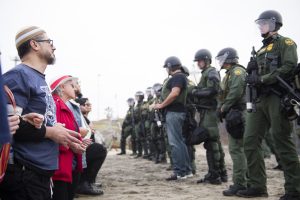5 Ways foundations can provide better rapid response funding to the MASA community

Rise Together Fund gave rapid-response support to representatives of the Council of American-Islamic Relations and prominent American Muslim civil rights activists to attend a protest against inhumane treatment of asylum seekers and migrants. Photo by Naaz Modan.
The Muslim, Arab and South Asian (MASA) community includes a diverse group of immigrants that is one of the fastest growing populations in the country.
But harmful policies and rhetoric to depict the MASA community and other immigrants as criminals and threats to the country under the guise of national security have only increased in number and intensity since 9/11. This undermines our country’s legacy as a place to seek freedom and opportunity.
Rapid response required to counter these threats have turned into long-term programmatic work for many organizations as these policies and rhetoric have increased in frequency and intensity. For the most part, funding has remained in rapid response mode.
In the past 2 years, Rise Together Fund (RTF), a donor collaborative of the Proteus Fund that has supported the MASA community for the past decade, has provided more than $250,000 in rapid response support.
RTF and Piper Fund – another donor collaborative of the Proteus Fund – shared 5 takeaways for funders and donors to make rapid response funding more effective for communities in NCRP’s Responsive Philanthropy:
1. Rapid response must be truly “rapid.”
While many funders were still taking months to approve rapid response grants, RTF was able to deploy funding within 1-2 weeks to help grantees get resources and funding as soon as possible to respond to urgent crises.“We streamlined our proposals, asking 3-5 questions for most grants, took phone applications if the situation required it and proactively reached out to organizations in hot spots,” explained Shireen Zaman, program director of RTF and Melissa Spatz, director of the Piper Fund.
2. Rapid response vehicles work best when they are known to the field.
“Activists are rightfully wary of who is collecting information on their work,” said Spatz and Zaman. Transparency and trust are key to identifying organizations to support and moving resources quickly. Because of RTF’s long-term relationships in the field, including key listservs, conferences and networks, they were able to identify and connect with organizations quickly.
3. Flexible funding (not just project funding) is critical.
Unrestricted funding can fill an urgent need to respond quickly, whether it’s to hire extra staff, translate materials and create resources to mobilize communities and respond to emerging threats.
“A small grant can sometimes close a salary gap or allow for the immediate hire of staff for an issue campaign poised to have a critical impact,” said Spatz and Zaman.
4. Funds are not enough.
Although funding quickly is critical to helping an organization recover and respond, there are emerging crises on a seemingly weekly basis. Communities still need to be resilient in order to recover quickly. RTF recognized that the community needed a place to share information and updates. Not only does it provide a place for organizations to build community and solidarity, it has helped RTF make their grants more effective.
5. Rapid response funding is not a substitute for long-term funding.
RTF recognizes that the increase in crises cannot be solved by rapid response funding. While rapid response support is critical to organizations to act quickly, organizations also need support for long-term strategy and capacity building to continue to counter the attacks and advance their agendas. While the movement is dealing with crisis after crisis, they are also trying to balance responding quickly with forming a long-term response.
“Without the long-term funding required to build the viability, visibility and tactical skills needed to articulate and advance their agendas, these communities will be unable to build the inclusive and participatory democracy they envision and will forever be playing defense in the face of emerging crises.”
For more information on how RTF and Piper Fund has used rapid response funding with a longer-term mindset, check out our February edition of Responsive Philanthropy.
